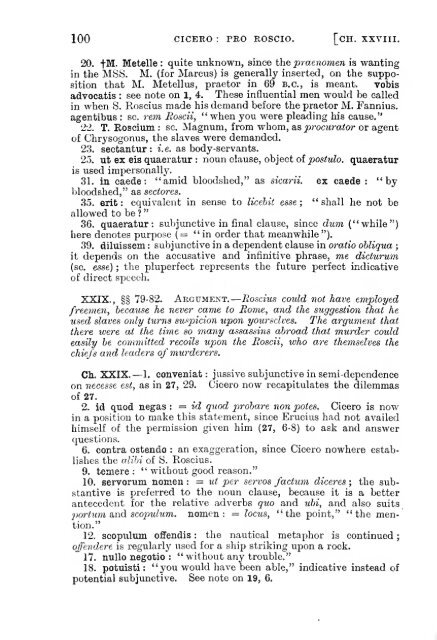Pro S. Roscio Amerino
Pro S. Roscio Amerino
Pro S. Roscio Amerino
Create successful ePaper yourself
Turn your PDF publications into a flip-book with our unique Google optimized e-Paper software.
"<br />
100 CICEBO : PRO<br />
ROSCIO. [CH. XXVIII.<br />
20. fM. Metelle : quite unknown, since the p)-aenomen is wanting<br />
in the MSS. M. (for Marcus) is generally inserted, on the supposition<br />
that M. Metellus, praetor in 69 b.c, is meant. vobis<br />
advocatis : see note on 1, 4. These influential raen would be called<br />
in when S. Roseius made his demand before the praetor M. Fannius.<br />
agentibus : sc. rem Jioscii, " when you were pleading his cause."<br />
22. T. Roscium : sc. Magnum, from whom, as procurator or agent<br />
of Chrysogonus, the slaves were demanded.<br />
23. sectantur: i.e. as body-servants.<br />
25. ut ex eis quaeratur : noun clause, object of postvlo. quaeratur<br />
is used impersonally.<br />
31. in caede : "amid bloodshed," as sicarii. ex caede : " by<br />
bloodshed," as sectores.<br />
35. erit : equivalent in sense to licebit esse ;<br />
allowed to be ?<br />
'<br />
' shall he not be<br />
36. quaeratur : subjunctive in final clause, since diun ("while")<br />
here denotes purpose ( = " in order that meanwhile ").<br />
39. diluissem : subjunctive in a dependent clause in oratio ohliqua ;<br />
it depends on the accusative and infinitive phrase, me dicturum<br />
(sc. esse) ; the pluperfect represents the future perfect indicative<br />
of direct speech.<br />
XXIX., §§ 79-82. Argument.— Roscius could not have employed<br />
freemen, because he never came to Eome, and the suggestion that he<br />
used slaves only tums suspicion upon yourselves. The argument that<br />
there were at the time so many assassins abroad that murder could<br />
easily be committed recoils upon the Roscii, who are themselves the<br />
chie/s and leaders of murderers.<br />
Cli. XXIX.— 1. conveniat: jussive subjunctive in semi-dependence<br />
on necesse est, as in 27, 29. Cicero now recapitulates the dilemmas<br />
of 27.<br />
2. id quod negas : = id quod prohare non potes. Cicero is now<br />
in a position to make this statement, since Erucius had not availed<br />
himself of the permission given him (27, 6-8) to ask and answer<br />
questions.<br />
6. contra ostendo : an exaggeration, since Cicero nowhere establishes<br />
the alibi of S. Roscius.<br />
9. temere " : without good reason."<br />
10. servorum nomen : = ut per servos factum diceres ; the substantive<br />
is preferred to the noun clause, because it is a better<br />
antecedent for the relative adverbs quo and uhi, and also suits<br />
2)ortum a,nd scopidum. nomen : = locus, " the point," " the mention."<br />
12. scopulum offendis : the nautical metaphor is continued<br />
offendere is regularly used for a ship striking upon a rock.<br />
17. nullo negotio " : without any trouble."<br />
18. potuisti : "you would have been able," indicative instead of<br />
potential subjunctive. See note on 19, 6.<br />
;

















